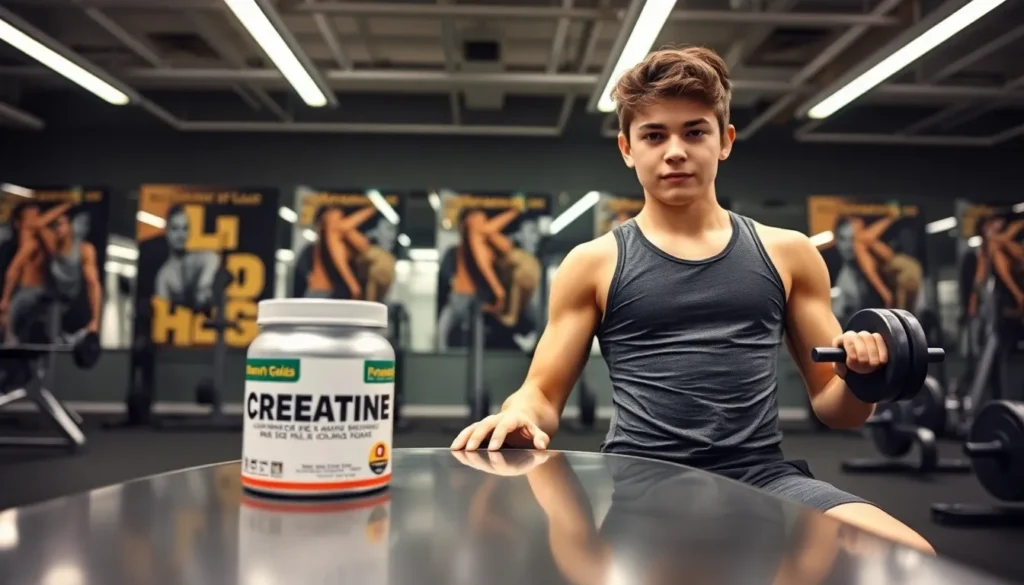Table of Contents
ToggleWhen it comes to fitness and nutrition, there’s always a hot topic brewing, and right now, that topic is creatine. Some say it’s a miracle supplement, while others are ready to burn it at the stake. But what’s the real deal? If you’re a teenager looking to pump up your workouts or just curious about if you can partake in this muscle-boosting wonder, you’ve clicked on the right article. Let’s jump into the nitty-gritty of creatine and its suitability for teenagers, quickly and with a splash of humor, of course.
Understanding Creatine: What Is It?

Creatine is a natural substance found in muscle cells. It helps muscles produce energy during high-intensity exercise. Think of it as a fuel tank for your muscles, ready and waiting for action. Creatine is created in the body from amino acids, primarily in the liver, kidneys, and pancreas. It’s also found in foods like red meat and fish. When it comes to supplementation, many athletes turn to creatine powders or capsules, aiming to increase their muscle mass and improve workout performance.
Though often seen as a magical shortcut to bulkiness, creatine is simply a tool. It works best along with a well-rounded diet and a solid workout routine.
The Science Behind Creatine and Muscle Growth
At the core of creatine’s appeal lies its role in muscle energetics. When engaging in intense exercise, muscles need immediate energy, which comes from a compound called adenosine triphosphate (ATP). But, ATP depletes quickly. This is where creatine steps in, helping to recycle ATP, keeping muscles fueled and ready to go for a few more reps.
Research shows that creatine can enhance performance in high-intensity, short-duration activities like sprinting, weightlifting, and even jumping. This means that teenagers involved in sports requiring quick bursts of energy may find creatine particularly beneficial.
Potential Benefits of Creatine for Teenagers
For teenagers, who are still developing, taking creatine might offer several advantages. Here are a few potential benefits:
- Improved Athletic Performance: Teenagers engaged in sports often experience intense physical demands. Creatine can help enhance performance in short bursts, potentially leading to better results on the field or court.
- Increased Muscle Mass: Many teens are focused on building muscle. Research indicates that creatine can help increase lean muscle mass when combined with resistance training.
- Faster Recovery: Many teens experience muscle soreness after workouts. Creatine supplements might help speed up recovery, allowing them to train harder and more often.
But, while the upside is compelling, it’s essential to look at the whole picture.
Risks and Considerations of Creatine Use
As with any supplement, using creatine is not without its risks. Here are some points to consider:
- Dehydration: Creatine pulls water into muscle cells, which can lead to dehydration if not enough fluids are consumed. Proper hydration is crucial.
- Gastrointestinal Issues: Some users report experiencing stomach cramps, diarrhea, and nausea. Starting with a lower dosage can help mitigate these effects.
- Kidney Concerns: While studies show creatine is generally safe for healthy individuals, teenagers with pre-existing kidney issues should avoid it.
It’s also important to remember that supplements can’t replace a balanced diet. A focus on whole foods should always come first.
Research on Creatine Use in Adolescents
Research on creatine usage in teens is still evolving. While many studies focus on adult athletes, a few have investigated its impact on younger people. The consensus indicates that creatine is safe for healthy adolescents when taken in recommended doses. One study on young athletes showcased improvements in strength and muscle mass, but parents and guardians should always consult a healthcare professional before allowing their teenager to start supplementation.
Recommendations for Teenagers Considering Creatine
If a teenager is considering creatine supplementation, here are some recommendations to keep in mind:
- Consult a Doctor: Before diving into supplementation, a visit to a healthcare professional is crucial. This is especially true for teenagers, who are still growing.
- Focus on Nutrition: Creatine should complement, not replace, a balanced diet rich in proteins, carbohydrates, and healthy fats.
- Stay Hydrated: Drink plenty of water, as hydration plays a critical role in muscle performance and health.
- Start Slow: If deciding to take creatine, starting with lower doses to gauge tolerance is wise.
Eventually, each teen’s body is different, and personalization is key in both diet and supplementation.




